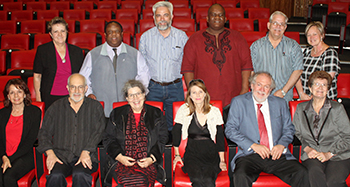Latest News Archive
Please select Category, Year, and then Month to display items
01 June 2023
|
Story Nicole Bongo
|
Photo Supplied
 University of the Free State students participating in one of the many projects coordinated by the Engaged Scholarship Office.
University of the Free State students participating in one of the many projects coordinated by the Engaged Scholarship Office.
To help make a change and push for sustainable development, the University of the Free State Division of Student Affairs works with communities around Bloemfontein fostering a culture of creating sustainable solutions.
Gernus Terblanche, Kovsie Support Services and Assistant Researcher in the Division says, ‘it is important for the university to be actively involved in the community as it makes up such a large portion of the Bloemfontein and students also
represent many different communities on and off- campus.’
Terblanche said: “As an educational institution it is vital for the UFS to support and guide students towards creating innovative solutions; both local and globally. Our experience is that students often come up with real solutions that can
make a real impact in the lives of real people – and it would be crucial to support such initiatives.”
The office has worked with BloemShelter, VermiVillage, GAP Equip, National Hospital and as part of the programmes of 2022 also with Lighuis, Talita Cumi, ROC Kids and the Universitas Neighborhood association. “We are also very fortunate to have,
Shanen Emam, Miss Free State 2023 as one of our students that are involved with our programmes,” added Terblanche.
One of the students involved is Prince Sijane, Bloemfontein Campus Student Representative Council member responsible for Civic and Social Responsibility when asked why student participation is important, he said, “By actively participating in
initiatives that address social issues or promote community well-being, students become more aware of the challenges faced by society.”
Tereblanche said: “The produce of these gardens addresses hunger and malnutrition amongst students on campus. KovsieACT also facilitates an eco-vehicle project during which student teams learn how to build electric vehicles powered by solar charging
stations. This project is aimed at developing skills appropriate to the 4th Industrial Revolution and sustainable resources development including clean and green energy.”
Special Edition of the Journal for New Generation Sciences launched at UFS
2016-10-26

Participants of the round-table discussion
at the launch of the Journal for New Generation
Sciences during the UFS Faculty of Education
colloquium which took place on 20 October 2016.
Photo: Oteng Mpete
The Journal for New Generation Sciences Special Edition was launched on 20 October 2016, at the Albert Wessels Auditorium, during the University of the Free State’s (UFS) Faculty of Education colloquium on the field of technological higher education and its contribution to the knowledge society.
Partnerships and knowledge production
Prof Laetus Lategan, Dean of Research and Innovation at the Central University of Technology (CUT), led the launch. “Higher education is not only about producing knowledge but it is also about fostering new relationships,” said Prof Lategan referring to CUT’s collaboration with the UFS Faculty of Education.
“Empowering people is important for capacity building, offering novice writers the opportunity to learn and a way to enhance their academic writing,” said Prof Lategan.
The Journal for New Generation Sciences is an accredited research publication in which scholars, internal and external to the institution, may publish. It accommodates national and international publications and showcases the university’s commitment to applied research.
Growing in leaps and bounds
According to Dr Somarie Holtzhausen, from the Faculty of Education’s School of Higher Education Studies, all papers are peer-reviewed by at least two experts. An editorial review also secures the quality of the paper. In 2014, when the journal was established, 30 contributions were submitted, although only 25 were successfully published.
“We turn down content not because it is not good, but unfortunately because it does not speak to the heart of the journal,” said Prof Lategan. With 60 peer reviewers, the journal’s contributors are assured that at least two peer reviewers will assess their article.
The Journal for New Generation Sciences supports both high-quality scholarly work of established researchers, and capacity building among new researchers.
During the round-table discussion various contributors to the journal spoke about their research and involvement in the publication of the journal.